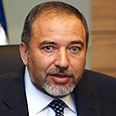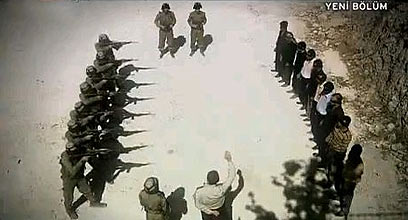


Turkish TV show has IDF soldiers 'killing' Palestinian kids
New prime-time program on Ankara's state-sponsored channel TRT1 depicts monstrous image of Israeli military as bloodthirsty, murderous. Foreign Minister Lieberman summons acting Turkish ambassador following Ynet report, says 'This is a serious case of state-sponsored incitement'
Seeing is believing? A new television show which debuted in Turkey recently may provide a partial answer to the recent spike in anti-Israeli sentiment evident in the country.
"Ayrilik" ("Farewell"), a prime-time show which airs on Turkish State-sponsored television channel TRT1 depicts the Israel Defense Forces as a murderous, bloodthirsty army.
"Broadcasting this series is a serious case of state-sponsored incitement. Such a series, which doesn’t even have a weak connection to reality, and which presents the IDF's soldiers as murderers of innocent children, is unworthy of being broadcast in enemy states, let alone in a country which had full diplomatic relations with Israel."
While the main plot is that of a love story which develops between the lead characters during Israel's January offensive in Gaza Strip, much of the show centers on the IDF's brutish activities.
In an episode of the show available on YouTube, Palestinians clash with IDF forces. Some of the Palestinians have firearms while others use simpler measures like stones.
At the end of the scene, an "IDF soldier" is seen passing by a body of a Palestinian youth and jolting it with his foot, as the youth's mother runs over in tears to cradle her son's body.
The following scene shows another "soldier" run a Palestinian girl into a street corer. She looks at him and smiles, but the "mission driven" soldier shoots her in the chest and watches her bloodied body drop to the floor before leaving the area.
The opening credits also show a particularly monstrous image of Israeli soldiers, as snapshots of explosions, tanks wreaking havoc, soldiers beating civilians and dead bodies everywhere light up the screen.
One of the shots also depicts a group of Palestinians facing an IDF firing squad.

Bloodthirsty. The firing squad scene
According to the show's website, it "brings to life the bleeding wound of Palestine. The show depicts all sides of the generations-long tragedy… This season focuses on the women and children and the Palestinian story, as well as the notion that the ultimate solution is love, compassion and world peace."
'Israelis are always the bad ones'
Diplomatic relations between Jerusalem and Ankara have been tense since Israel launched Operation Cast Lead. Turkish Prime Minister Recep Tayyip Erdogan proved one of the operation's harshest critics.
Relations with turkey seem to have taken a turn for the worst earlier this week, as Ankara decided to cancel an annual joint air force drill with Israel.
Jackie Angel, a representative of the Jewish community in Ankara, told Ynet that the Turkish media's attitude towards Israel has been bad for a long time.
"The Israelis are always the bad ones and the Palestinians are the good ones. There's nothing new here. During the Gaza war the biased coverage was catastrophic. There weren't two sides, only the Palestinian side."
He stressed that "in day-to-day life these things have no effect. Both as Jews and as Israelis we don't feel any change towards us on the part of Turkey. The things get seem stronger only on the Israeli media."
Meanwhile, Turkish experts are also pessimistic in regards to the diplomatic crisis between the two countries. "If bilateral relations between Turkey and Israel touched bottom after that incident, the current crisis shows that they are to remain there for some time to come," Ilker Ayturk, a political science professor at Bilkent University in Ankara, told Time magazine.
"Until very recently, it was the upper echelons of the Turkish military who determined the scope and pace of the strategic relationship between Israel and Turkey," Ayturk says. "What we are witnessing is the chief of staff allowing, willy-nilly, Erdogan to take the initiative. They are acquiescing in a 'political' decision."
Roni Sofer and Anat Shalev contributed to this report
Initial information for this story was received via RedMail















